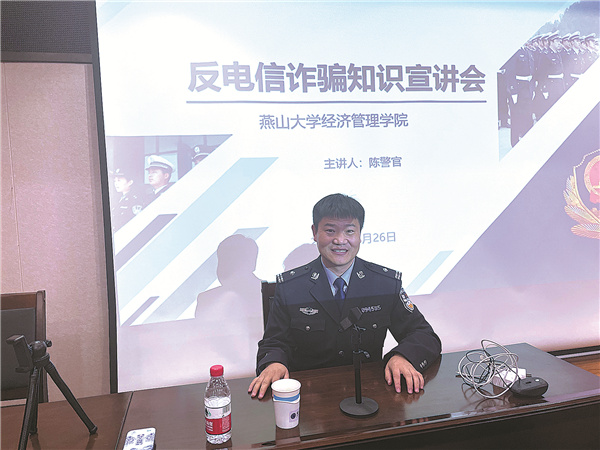

Dedicated to duty
As a child, Chen wanted to be a policeman. After serving in the military for 10 years in Northwest China, he joined the police in Qinhuangdao in 2006.
During his 16 years as a policeman, Chen experienced some life-threatening moments in the line of duty. Once, during a high-speed pursuit, Chen's police car crashed into a drug dealer's vehicle to stop it getting away.
"It was my job, and is not worth mentioning," the former policeman says.
Due to the surge in cyber fraud and scam cases, in 2017, three police officers, including Chen, joined the newly established Haigang District Anti-Fraud Center. That year, police cracked 131,000 cases of telecom fraud and detained 53,000 suspects across the country. Last year, the number climbed to 441,000 cases and 690,000 suspects, according to data from the Ministry of Public Security.
"When a woman of my mother's age knelt down in front of me, begging for help to get her money back, it broke my heart and I wanted to do something," Chen says.
In 2018, he started to create anti-fraud video clips in his spare time. The first one was based on a real case about how a private campus loan scam trapped students in college.
Between 2018 and 2019, Chen and his team created more than 20 video clips introducing the dangers of online scams.
"I enjoyed shooting those videos, but there was no budget from the center. Livestreaming just needs a smartphone and can reach more people," Chen says, adding that he began livestreaming on short-video platforms, like Douyin and Kuaishou, in September 2020.
As of August 2020, Douyin had more than 600 million daily active users, with an average of 33 hours per capita browsing a month. By the end of 2020, Kuaishou had more than 264 million daily active users.
In Chen's eyes, online platforms are more effective than traditional methods in disseminating anti-fraud knowledge, such as distributing pamphlets and visiting communities to explain related laws.
At first, Chen tried giving his usual anti-fraud lectures online, which didn't get him many followers. He began to study other livestreamers to learn how they hosted and managed their audience in livestreaming rooms. His efforts paid off in September, when he conducted a lianmai (connected mic) with a funny streamer, which went viral immediately. Lianmai is a popular function where two livestreamers are randomly paired and talk on one screen to viewers of both, which helps promote both channels.
On Sept 3, he livestreamed for six hours on Douyin and Kuaishou, which has been viewed more than 120 million times, according to reports.
Chen's videos are reported to be part of a new, proliferating genre of police-influencer content, deployed to improve the anti-fraud app's appeal.
"When I became an overnight viral sensation on Sept 3, I knew there would be different voices, like criticism and questions, but I didn't expect there to be so many jianpanxia (keyboard warriors), whose words were totally irresponsible," Chen says.
"It is time that we should reflect on the challenges brought by public opinion on social media," he says.
According to the China Internet Network Information Center, the number of internet users in China had reached 1.03 billion by December last year. On one hand, the internet helps the authorities understand real public opinion, while on the other, there is a surge in cyber defamation.
Chinese law stipulates that insults resulting in serious humiliation constitute a crime.
Since 2019, procuratorial organs around the country have approved the arrest of 168 people suspected of the crimes of insult and libel, according to the Supreme People's Procuratorate.
For Chen, there is still a long way to go.